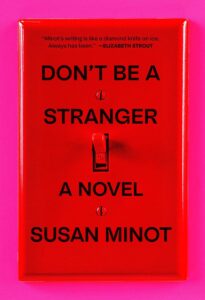Book Review: ‘Don’t Be a Stranger’ by Susan Minot
Published 1:58 pm Tuesday, November 12, 2024

- Susan Minot
This Thursday, Nov. 14, from 6 to 7 p.m., Susan Minot, hosted by Square Books and the Thacker Mountain Radio Hour, will read and sign books at the Powerhouse.
By Allen Boyer
“Don’t Be a Stranger,” by Susan Minot, is a skillful, subtle novel about what Shakespeare called lust in action – the story of a bright, talented woman who expends her spirit in a waste of shame.
At a dinner in Greenwich Village, Ivy Cooper, a writer aged fifty-two, with a young son, meets Ansel Fleming, a musician, eighteen years younger. She knows he recently spent seven years in prison. She listens to him say that he travels and works on his music and talks at schools. As dinner ends, as he types her number into his phone, “she could study his head with its tangle of shiny hair like licorice. She wondered how long his hair was. She wondered what kind of sex he liked. And what it would be like to have it with him.”
 The affair that follows is one-sided. Ivy constantly scrapes up money for sitters, pedals a bicycle through Manhattan traffic to his apartment, sends emails and texts.
The affair that follows is one-sided. Ivy constantly scrapes up money for sitters, pedals a bicycle through Manhattan traffic to his apartment, sends emails and texts.
Ansel, meantime, shows a penchant for detachment and a genius for laconic deflection.
“What had he been up to? . . . . Working, he said. I don’t need to talk about it. Get into all the details. It hit her like a board, all the days he didn’t give her details. It seems you don’t want to get into anything much, she said, and immediately regretted it. I mean, she said in a lighter tone. I’ve been wondering where you were. I’m not a checker-inner, he said. Yes, I got that. Now I’m checking in, he said.”
Often, Ivy shows the gifts that make a writer (Minot’s formidable talent is on loan to her heroine). At a birthday party, “a trio of dads stood with green bottles of beer at their chests, as if badges of manhood.” But Ivy is fortunate that her story is told by so sympathetic an author. Had she wandered into “The Bonfire of the Vanities,” Tom Wolfe would have skewered her – for disregarding every red flag in Ansel’s background (no crime that earns you seven years in prison is negligible), and for the masochism she shows in hurling herself at a man whose only engagement with her is sexual.
At a dinner party, a journalist remarks that “there was a major flaw in ‘Anna Karenina’ – the deterioration of the heroine. Here was a strong vital woman with a discerning intelligence . . . Tolstoy never convinces us that this vibrant person could deteriorate into someone with the weakness to throw herself under a train. Ivy did not point out the journalist must never have known the devastation of love and sex taking over her life.”
There’s a hall of mirrors here, authors reflecting on characters. Is this Ivy defending Anna, justifying herself; or is this Minot speaking, hinting that Ivy sees how badly her own passion has devastated her own life?
Minot sees that Ivy is independent to the point of pathology. She had a husband who excelled at handling crises; rather than adapt her life to stay with him, she left him. A man who won’t engage emotionally may be exactly the sort of man whom Ivy is really looking for.
“So after a week, she texted a breezy hello. He texted back, breezy, too. The reply gave her that nervous thrill. Don’t be a stranger, he said, saying what she had said.”
In that exchange, ironically, lies a warning on which the novel turns. Characteristically, Ivy estranges herself from others. “Don’t be a stranger” is more than a breezy phrase; it’s a warning; and Ivy might heed it, were she listening.
And Minot understands what’s going on. The cover of “Don’t Be a Stranger” shows a light switch flipped up to ON. It’s a phallic symbol, and it’s clever – and it’s brightly lit in warning-light red.
“Don’t Be a Stranger.” By Susan Minot. Alfred A. Knopf / Penguin Random House. 320 pp. $28.
Allen Boyer grew up in Oxford and now writes in New York City.





